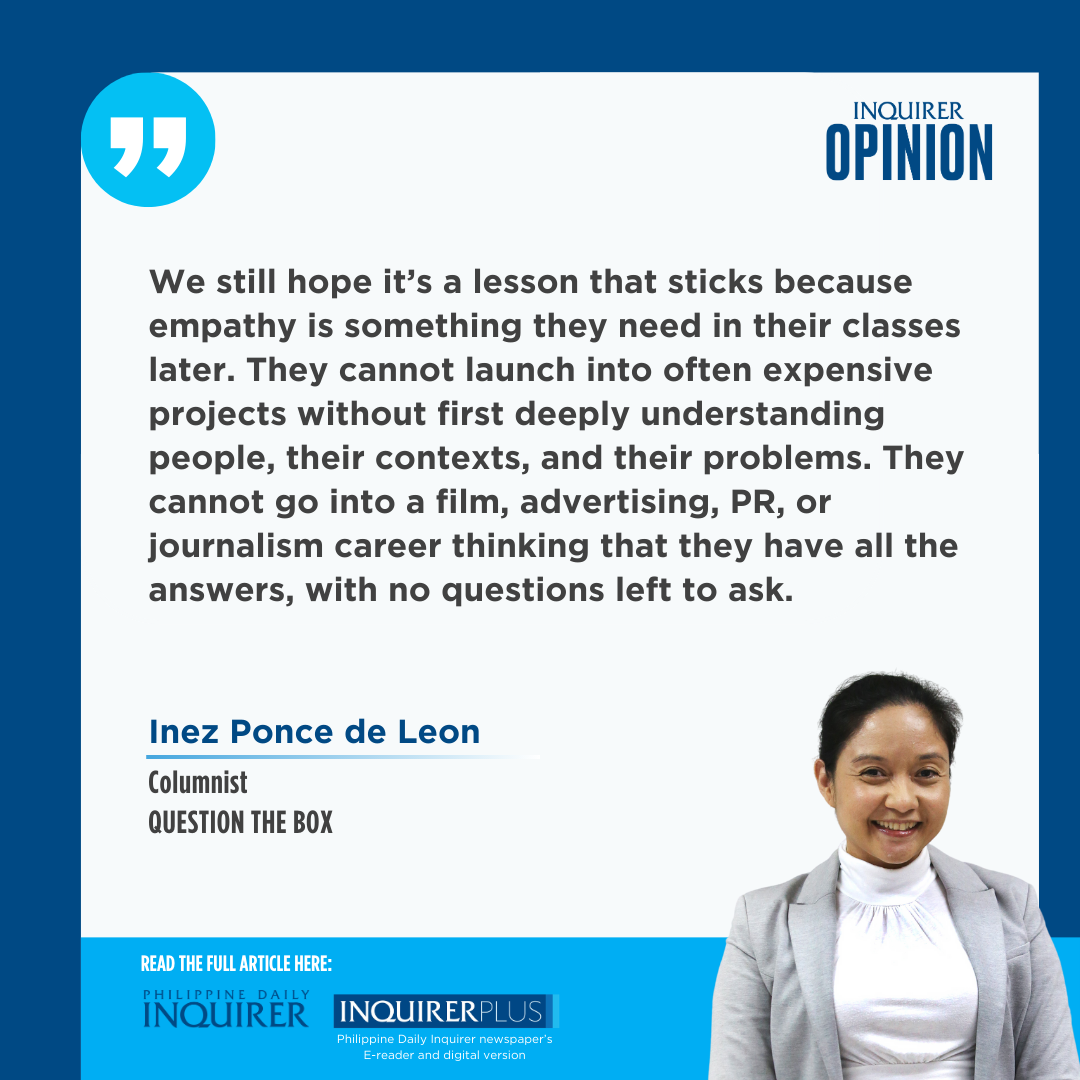Lessons in empathy
 This semester, I am teaching the department’s creativity course, a required class for our communication sophomores.Most people think it’s an easy A, a freewheeling class. Creativity, however, as conceptualized by our department, and when taught for the social science that is communication, is about human-centered design.
This semester, I am teaching the department’s creativity course, a required class for our communication sophomores.Most people think it’s an easy A, a freewheeling class. Creativity, however, as conceptualized by our department, and when taught for the social science that is communication, is about human-centered design.
Students do create, but they must make a research-based intervention that is responsive to the problem of a specific group of people, within a specific context, with their unique backgrounds, characters, and needs.
We’re free to tailor the course according to our expertise and teaching philosophy. In my two sections, I challenge my students to design things on a strict time limit. I also introduce them to the paradigms and philosophy of social sciences research so that they can see the breadth of communication as both research and practice.
Human-centered design is our nonnegotiable lesson. Our students need to be challenged to think beyond their social media feeds and the comforts of home. They need to live the life of another human being, to appreciate the complexity of problems rather than judge people and attempt to fix what they perceive the problem is.
Article continues after this advertisementOur challenge? The students themselves. Some have the reputation of wanting high grades with minimum intellectual effort. Many are known for keeping to social media, interested in nothing but that which they can relate to, ignoring anything deemed boring no matter how useful. Others have shown symptoms of a rather eyebrow-raising messianic complex, as though they had all the answers to “save” and “educate” people.
Empathy, on the other hand, is the willingness to be genuinely interested in someone else’s life from their perspective; to set aside one’s assumptions and listen; to read and appreciate previous research. It’s difficult to teach, and it’s been more challenging these last few years with students who sometimes want less research, more creating.
We still hope it’s a lesson that sticks because empathy is something they need in their classes later. They cannot launch into often expensive projects without first deeply understanding people, their contexts, and their problems. They cannot go into a film, advertising, PR, or journalism career thinking that they have all the answers, with no questions left to ask.
Article continues after this advertisementWe’ve gone through many thesis groups, after all, who employ a “wala lang” (whatever) mentality. When asked: why are you doing this research? Why are you making this film? Why are you launching this event? Their answer: Whatever, it just looks like fun!
To have to deal with such thesis groups is painful because we look at them and think: where did all your lessons go? Don’t you remember when you were angry at oppression and corruption? Now that you have a chance to know things deeply, and maybe even change them, why are you backing away into Whatever Land?
Yet teach them we must. Challenge them, we will. And sometimes, we’re rewarded with glimmers of brilliance.
Last week, I began our deeper empathy discussions with a story. A student (from a class I had once taught years ago) visited a fishing village and noticed that the fishermen would sail out during a storm. Didn’t they know it was dangerous, she asked. They probably didn’t, so she proposed an app with weather forecasts and lessons on what not to do.
I asked my students, “What’s wrong with this approach?”
I expected them to start with the usual: there’s no internet, our fishermen are poor, saltwater destroys smartphones.
In each of my two classes, the hands kept coming up, and the answers were different.
One student said that she had also visited a fishing village and found out that fishermen sail during storms because the strong waves destroy the private fish pens. Storms mean a bigger catch and higher profits because the once off-limits fish pens are now accessible.
Another added that the capitalist system encouraged such behavior, so the problems were much bigger if lives were deemed less important than livelihood. Why didn’t the student first ask the fishermen about their knowledge and experiences with storms?
Another said that many fishermen have learned about the sea through experience. Giving them an app is like forcing them to learn another language, one that is foreign to their worldview.
They’re not ignorant, another student insisted. Their problems just aren’t the same as ours. The app also doesn’t solve the problems of greed and abuse of power.
What would stop a fisherman from using the app to find out when a storm is coming, so that they can sail out for maximum profit? another student countered.
There were so many answers, as I stood in front of two classes that afternoon, watching as my once silly jesters spoke with insights incubated from over a year of studies in communication theory, philosophy, and theology.
They had been called upon to truly empathize, with both creativity and gravitas, and they did it in mere seconds.
The kids are all right. We just have to challenge them.
—————
iponcedeleon@ateneo.edu















